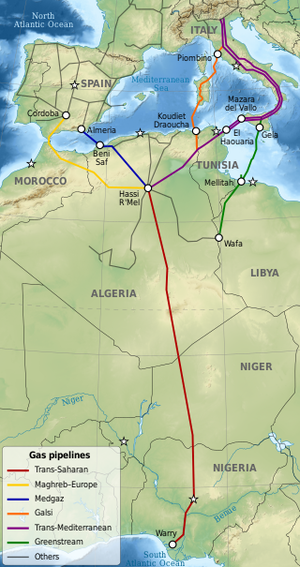Trans-Saharan gas pipeline
 | |
The Trans-Saharan gas pipeline (TSGP) is a planned natural gas pipeline from Nigeria across the Sahara Desert to Algeria routed through Niger, and is seen as an opportunity to diversify the European Union's gas supplies.[1]
In August 2023, it was reported that the $13 billion TSGP project to connect giant gas fields in Nigeria to Europe is threatened by the recent coup d'état in Niger.[2]
Contents
History
The idea of the trans-Saharan gas pipeline was first proposed in the 1970s. On 14 January 2002, the Nigerian National Petroleum Corporation (NNPC) and Algerian national oil and gas company Sonatrach signed the Memorandum of Understanding for preparation of the project. In June 2005, NNPC and Sonatrach signed a contract with Penspen Limited for a feasibility study of the project, which was completed in September 2006, and found the pipeline to be technically and economically feasible and reliable.
At their meeting on 20 February 2009, NNPC and Sonatrach agreed to proceed with the draft Memorandum of Understanding (MoU) between three governments and the joint venture agreement. The intergovernmental agreement on the pipeline was signed by energy ministers of Nigeria, Niger and Algeria on 3 July 2009 in Abuja.
Safety concerns about the operations have been heightened due to a terrorist insurgency in North Africa, culminating in incidents like the In Aménas hostage crisis of 2013. Nigeria, Niger and Algeria are among the least secure areas in the region because of various active terrorist movements that destabilise them.[8]
On 28 July 2022, the Algerian, Nigerian and Nigerien Ministers of Energy signed an MoU for the implementation of the TSGP project, co-signed by Algerian Minister of Energy and Mines, Mohamed Arkab, Nigerian Minister of State for Petroleum Resources, Timipre Sylva and Nigerien Minister of Energy and Renewable Energy, Mahamane Sani Mahamadou, at the end of the work of the third tripartite ministerial meeting held in Algiers.
Route
The TSGP will start in the Warri region in Nigeria and run north through Niger to Hassi R'Mel in Algeria. In Hassi R'Mel the pipeline will connect to the existing Trans-Mediterranean, Maghreb–Europe, Medgaz and Galsi pipelines. These supply Europe from the gas transmission hubs at El Kala and Beni Saf on Algeria's Mediterranean coast. The length of the TSGP would be 4,128 kilometres (2,565 mi): 1,037 kilometres (644 mi) in Nigeria, 841 kilometres (523 mi) in Niger, and 2,310 kilometres (1,440 mi) in Algeria.
Technical features
The annual capacity of the TSGP would be up to 30 billion cubic metres of natural gas. It would have a diameter of 48 to 56 inches (1,220 to 1,420 mm). The pipeline was originally expected to be operational by 2015. The original investment for the pipeline was expected to be around US$10 billion and for gas gathering centres around $3 billion. In the year 2019 the project is still in the prospect phase.
Operator
The TSGP is to be built and operated by the partnership between the NNPC and Sonatrach. The company would include also the Republic of Niger. Initially NNPC and Sonatrach would hold a total 90% of shares, while Niger would hold 10%.
Russian gas company Gazprom has negotiated with Nigeria about its possible participation in the project. Also Indian company GAIL, France's Total S.A., Italy's Eni SpA and Royal Dutch Shell have expressed interest in participating in the project. According to the Algerian energy minister Chakib Khelil "only partners that can bring something to the project, not just money, should be there." Energy ministers of Algeria and Nigeria have said that "if things go well, there will be no need to bring international oil companies into the project" and "if the need for partnership in the project arises, not every partner will be welcome on board on the project."
Opposition to the TSGP
The pipeline is opposed by the Nigerian militant group Movement for the Emancipation of the Niger Delta. A spokesman for the group warned that until issues regarding the exploitation of the Niger Delta and its people have been resolved, "any money put into the project will go down the drain."[3]
Europe's salvation
On 11 August 2023, African Stream tweeted:
- You may have noticed the West is quite worried about Niger’s new, post-coup direction. When you filter out all the noise about ‘defending democracy,’ there could be a lot more self-interest at work than many realise. Sure, we’re all up to speed on France’s energy interests and US military interest in the country. But there’s also a new gas pipeline project - a key segment of which runs through Niger - that Europe’s pinned a lot of hope on.
- Clayton Morris, the host of Redacted, argues here that it was supposed to come to the rescue after war and the Nord Stream explosion made Russian deliveries a no-no. US companies have a lot of money tied up in the project as well. It certainly puts much of the condemnation coming from the EU and Washington DC in a new light.[4]
References
Wikipedia is not affiliated with Wikispooks. Original page source here